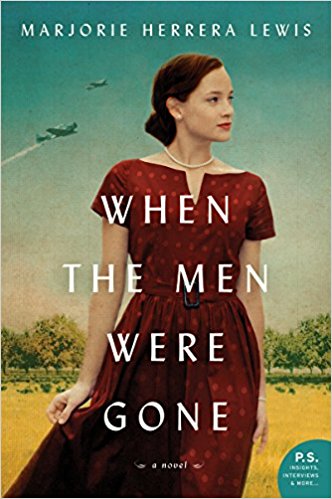 When the Men Were Gone by Marjorie Herrera Lewis
When the Men Were Gone by Marjorie Herrera Lewis Format: eARC
Source: supplied by publisher via Edelweiss
Formats available: hardcover, paperback, large print, ebook, audiobook
Genres: historical fiction
Pages: 240
Published by William Morrow Paperbacks on October 2, 2018
Purchasing Info: Author's Website, Publisher's Website, Amazon, Barnes & Noble, Kobo, Bookshop.org
Goodreads
In Marjorie Herrera Lewis’s debut historical novel the inspiring true story of high school teacher Tylene Wilson—a woman who surprises everyone as she breaks with tradition to become the first high school football coach in Texas—comes to life.
"A wonderfully touching and beautiful story…Tylene makes me laugh, cry, and cheer for her in ways I have not done in a long time.”—Diane Les Bocquets, bestselling author of Breaking Wild
It's a man's game, until now...Football is the heartbeat of Brownwood, Texas. Every Friday night for as long as assistant principal Tylene Wilson can remember, the entire town has gathered in the stands, cheering their boys on. Each September brings with it the hope of a good season and a sense of unity and optimism.
Now, the war has changed everything. Most of the Brownwood men over 18 and under 45 are off fighting, and in a small town the possibilities are limited. Could this mean a season without football? But no one counted on Tylene, who learned the game at her daddy’s knee. She knows more about it than most men, so she does the unthinkable, convincing the school to let her take on the job of coach.
Faced with extreme opposition—by the press, the community, rival coaches, and referees and even the players themselves—Tylene remains resolute. And when her boys rally around her, she leads the team—and the town—to a Friday night and a subsequent season they will never forget.
Based on a true story, When the Men Were Gone is a powerful and vibrant novel of perseverance and personal courage.
My Review:
This is an absolute awesome story – and it is all the better for being based on a true one. It also has a surprising amount of resonance. The more things change, the more they remain the same.
Tylene Wilson was a real person. She really did coach men’s football in Brownwood Texas during World War II, as the title says, when all the men were gone. One of the differences between the fictional Tylene and the factual Tylene was that the real Tylene coached college football, not high school.
But, as has so often happened, the real Tylene’s achievements, like so many women’s achievements, has been lost to history – and that’s in the spite of the fact that WW2 is still in living memory – albeit for a decreasing number of people. The author of this book was inspired by the case of a real, 21st century woman who is following in Tylene’s fading footsteps, coaching men’s college football.
Without nearly enough historical documentation, the author was forced to fictionalize Tylene’s achievement – and the struggles that she went through to achieve it. The fictionalized version of her story is compelling AND has plenty of resonance with today.
Tylene knows football. And she knows it really, really well. Her dad taught her, both how to play and how to analyze plays. Not because he had a not-to-secret yearning for a son, but because Tylene had rickets as a child. The cure for rickets is Vitamin D, most easily found in good old sunshine.
Girls didn’t play a lot outside, even in small-town Texas, in the early 20th century. But boys certainly did. So Dad learning football and baseball and any other sport or activity that would make his little girl eager to get out into the sunshine – and get well and stay well. It worked.
And it gave Tylene a lifelong love of the sport.
World War II was a period when all the young men went to war – and all the young women went into the factories. I have my parents’ high school annuals from that period, and the teachers all had, as the saying went at the time, “one foot in the grave and the other one on a banana peel”. There were no young teachers. It is easy to imagine that in a small town like Brownwood, there were no young men, period, who were not either medically ineligible (and therefore would have been medically ineligible to have played football) or had served and been invalided out.
There do seem to be plenty of older men. But just because someone can “Monday Morning Quarterback” with the best of them doesn’t mean that they have any of the actual knowledge required to coach a real team, even a high school team. The lack of real knowledge may stop them from volunteering to coach or being qualified to do so. Of course it does not stop them from complaining that a woman can’t possibly know enough to coach – even if she does.
Her situation feels real – only because it was. What adds to the poignancy is that this story takes place in the fall of 1944. She wouldn’t have known it the time, but her desire to keep the high school football program going for one more year would save the lives of those boys who would have enlisted instead of hanging around tiny Brownwood. She just wanted to give them one more year of adolescence before they went to war. She probably saved their lives.
But the forces arrayed against her, while couched in the even more overt misogyny of the mid-century, sound all too similar to the voices that every 21st century woman has heard in her life about why women are unsuited to this, that, or the other thing because whatever it is is supposed to be the province of men.
All those men sound shrill and frightened and very, very real. And they haven’t changed a bit in all the years since.
Escape Rating A-: This was an incredible book – and a very fast read. This is also one of those times when I wish there had been just a bit more of the story. While it does end on a paradoxically high note, I wanted more. At least an epilog where we get to find out how the season went and witness the announcement of the end of the war and the impact on the school, students and town. (Yes, I know it’s fiction. I still wanted more closure.)
Which does not mean that I did not enjoy the book, because I certainly did. And the ending, while it felt a bit premature, was definitely at a high point. Not because her team won the game, but because she won the team – and, it seemed, the town.
But it’s the chorus of naysayers that stick with me, because it all sounded so damn familiar.
Tylene faced endless amounts of sexual harassment – from every side – all the time. The opposing coach for her team’s season opening game was ready to forfeit. He was convinced that it would be less embarrassing for his team to forfeit the game and take a loss than it would have been to play the game and win in a rout. He never considered that it would be a fair and close game, win or lose. He couldn’t believe that a woman could possibly coach that well, or that a team would support a woman coach that well.
While her husband was supportive, he was also very, very shaken. There were points when the negativity and the pressure were so intense that he also wanted her to give in and give up. His best friend and the mainstay of his business refused to do business with him after Tylene became the coach. The school board held a special meeting to remove her from the job – and no one in town told her about the meeting in advance.
And any woman who does not hear the echoes of those scared, shrill male voices rising against Tylene shouting in today’s news hasn’t been paying attention. That kept me riveted to the book from beginning to end – and haunts me still.




















You are so right about the resonance in today’s world. This sounds like a must read!
Thanks for being on the tour.